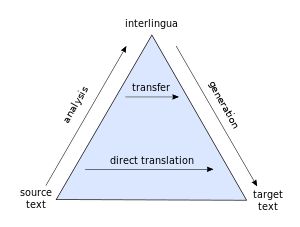User:Tony1/Tips for optimising Google Translate results

The Wikimedia movement nurses a great irony: language is both its great enabler and a heartless excluder that robs us of active discourse, fresh ideas, impetus, and a sense of fairness and openness. The movement needs to talk across languages, on both institutional and individual levels.
While most humans are bilingual (a phenomenon that probably goes back thousands of years), Wikimedians' language profiles are often not in common with the fellow Wikimedians they want to communicate with. English does provide a degree of commonality, as it does off the internet; but the costs are felt by everyone, since not all Wikimedians speak English well or at all (and why should they?); to make matters worse, native anglophones have a very weak tradition of learning foreign languages.
This is not a happy situation. The two alternatives to knowing each other's language bring their own hurdles:
- the sheer cost of human translation (whether volunteer time and effort, or financial where paid translators are required); and
- the low reliability of machine translation, which will improve only marginally.
Machine translation is crude, and will continue to be for decades; but regrettably, sometimes it's the only option when Wikimedians have to email each other or communicate on-wiki. Fortunately, there are ways to get the best out of machine translation. This page suggests several ways to do this with the most commonly used application, Google Translate. In this sense, Google Translate is best used as an assistant, with considerable human effort to optimise the results. In summary: don't trust Google Translate by itself.

The fundamentals[edit]
- Human editing will almost always be needed to make the result good. Often "good" is not required, but we need to be vigilant against misleading results, which can be embarrassing or irritating to your reader, or worse, can derail your discourse with them. Always warn your reader if you're using Google Translate in a message—whether onwiki, or offwiki in emails, skypetype, and similar—unless they know already.
- It's much easier to use Google Translate when you're a native speaker of the target language (e.g. English source, French target, fixed or at least "filtered" by a native French-speaker).
- Some languages produce better results than others. English as source or target language is usually better than between two non-English languages (which in many cases have to go through English in an often-disastrous multi-stage process, like Urdu ↔ Hindi ↔ English, or Catalan ↔ Spanish ↔ English).
- Your task is both lexical (translating individual words correctly) and the greater challenge, grammatical (getting the combinations of words right, or at least avoiding the worst snags). Google Translate does not apply grammatical rules; it is, unfortunately, little more than a fast and slightly enhanced dictionary.
- Drop all pretense to writing beautifully. Clarity is your aim, and stubby, narrow wording is more likely to be safe.
- Word-by-word translations could sound as complete nonsense in the target language ...
Basic tips when writing from the source language[edit]
Let's assume one-to-one communication from English to a target language. (We could develop tips for each individual language, but that's beyond the scope of this page.) Each item in the list is expanded on and exemplified below.
Use shorter rather than longer sentences[edit]
- Use simpler rather more complex grammar
Avoid idiomatic language, slang, or loose, informal conversational wording[edit]
Avoid obvious metaphors[edit]
(which word is dangerous in the opening sentence of this page ... "The Wikimedia movement nurses a great irony"?)
Some languages, notably Mandarin, resist metaphor. ...
Avoid homonyms[edit]
or if you must, check the result by back-translating.
Word placement[edit]
Keep your adjectives and adverbs near the words they refer to (Jon Miles)
Verbal phrases[edit]
How to convey the right tone[edit]
Sometimes friendliness/politeness tags will go all wrong.
Target language ... no tense? Then put in explicit temporal words.
Target language ... gendered? Be careful with "it". In fact, with back-references generally.
Procedural tips:
- Type in individual words and small groups of words to check the result on a local level;
back-translate local phrasing too, if you're unsure or it really matters. Google Translate often reveals more when you ask for less. Site for back-translating: [1]
Be safe, not sorry!
Basic tips when reading a translated text[edit]
en:Comparison of machine translation applications
"some systems are able to translate more accurately if the user has unambiguously identified which words in the text are names" (en.WP MT)
"Behind this ostensibly simple procedure lies a complex cognitive operation. To decode the meaning of the source text in its entirety, the translator must interpret and analyse all the features of the text, a process that requires in-depth knowledge of the grammar, semantics, syntax, idioms, etc., of the source language, as well as the culture of its speakers. The translator needs the same in-depth knowledge to re-encode the meaning in the target language.
Therein lies the challenge in machine translation: how to program a computer that will "understand" a text as a person does, and that will "create" a new text in the target language that "sounds" as if it has been written by a person."
See also[edit]
- "Write for machine translation", by Jon Miles, a site found after writing this page.
